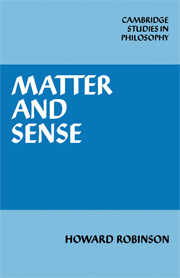Book contents
- Frontmatter
- Contents
- Acknowledgments
- 1 The materialist's problem and some non-reductive solutions
- 2 Supervenience and reduction
- 3 Behaviourism and stimulus materialism
- 4 The causal theory of mind
- 5 The disappearance theory
- 6 Reductive theories of perception
- 7 Matter: turning the tables
- Conclusion
- References
- Index
4 - The causal theory of mind
Published online by Cambridge University Press: 07 May 2010
- Frontmatter
- Contents
- Acknowledgments
- 1 The materialist's problem and some non-reductive solutions
- 2 Supervenience and reduction
- 3 Behaviourism and stimulus materialism
- 4 The causal theory of mind
- 5 The disappearance theory
- 6 Reductive theories of perception
- 7 Matter: turning the tables
- Conclusion
- References
- Index
Summary
TWO VERSIONS OF THE THEORY
By following the development of behaviourism in the face of various problems, we saw that it is naturally transformed into some form of physicalism. The forms of physicalism to emerge from this process were stimulus materialism and the causal theory of mind. However, a close examination of the stimulus theory has shown that it must inevitably develop in the direction of the causal analysis. The causal theory, therefore, appears to be the natural heir to the whole reductionist tradition of materialist thought.
There are two importantly different versions of the causal approach to the analysis of mind. According to the first, a mental state is whatever state mediates between stimulus and response in a certain sort of way. It is hypothesised that brain states will be found to have this mediatory role. These brain states are, therefore, identical with mental states, and this first version of the causal theory is, consequently, a form of the mind–brain identity theory. According to the second version of the theory, a mental state is a state of the organism as a whole, which that organism possesses in virtue of having some causal state which mediates appropriately between stimulus and response. The mediating state is not, in this case, identical with the mental, but is only the logical foundation of the organism's being in the mental state. This is, therefore, not a form of the mind–brain identity theory. The difference between these theories will be developed in the course of the discussion, and we shall see that it reflects different analyses of dispositional concepts.
- Type
- Chapter
- Information
- Matter and SenseA Critique of Contemporary Materialism, pp. 51 - 78Publisher: Cambridge University PressPrint publication year: 1982



